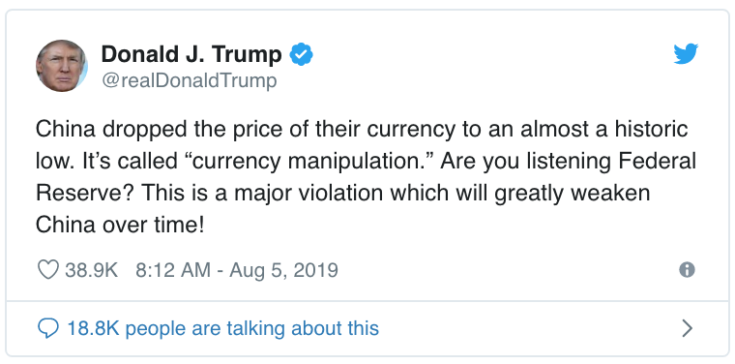
In areas such as rent control and minimum wage laws there’s an increasing tendency to ignore the basic laws of economics, and hope they somehow don’t apply to the policy being considered.
President Trump provided another example in this recent tweet:
 There are multiple errors here. The first sentence is incorrect; the yuan was much lower when I first visited Beijing in 1994. The second sentence is also incorrect, for two different reasons. Currency manipulation is defined as artificially depreciating a currency to create a current account surplus. China’s current account is roughly balanced, and the depreciation reflected market forces. So there is no currency manipulation, no “major violation” of any agreement.
There are multiple errors here. The first sentence is incorrect; the yuan was much lower when I first visited Beijing in 1994. The second sentence is also incorrect, for two different reasons. Currency manipulation is defined as artificially depreciating a currency to create a current account surplus. China’s current account is roughly balanced, and the depreciation reflected market forces. So there is no currency manipulation, no “major violation” of any agreement.
One irony here is that it is President Trump’s policies that have caused the yuan to depreciate, as is explained in any principles of economics textbook. When country A puts tariffs on the exports of country B, the currency of country A will appreciate and the currency of country B will depreciate. This is ECON 101.
In a world with more that 2 countries, there will be additional effects. China’s currency depreciation will push it to sell more goods to third parties, such as Europe. That will cause depreciation of the euro—another issue that Trump has complained about. Because the dollar would be expected to appreciate against almost all currencies, the US will buy more goods from third parties.
Textbooks also teach us that tariffs will not improve the trade balance, which depends on saving/investment imbalances. Textbooks also tell us that a major fiscal stimulus will cause the trade deficit to get larger. And that’s exactly what has happened, the trade deficits has become even “worse” over the past two years in response to Trump’s enormous fiscal deficits.
Trump’s reference to the Fed is an allusion to his earlier plea that the Fed manipulate the dollar lower. It’s not clear why he would want the Fed to do that, as in the final sentence he says that currency manipulation will weaken China over time. So why encourage the Fed to manipulate the dollar? Wouldn’t that also weaken America over time?
Here’s King Canute:


READER COMMENTS
John Hall
Aug 5 2019 at 12:53pm
One of your common fiscal stimulus arguments is about monetary policy offset. Presumably that also applies to fiscal tightening as well, correct? I’m curious about the application of this thinking to tariffs.
I suppose one difference is that a general tax hike would affect everything more-or-less proportionally, whereas a tariff might affect some goods more than others, which has greater distributional effects.
Scott Sumner
Aug 5 2019 at 2:55pm
John, Monetary offset should apply to the demand side impact of tariffs, but not the supply side impact. (The same as for fiscal policy.)
Of course that assumes the Fed is doing its job.
Thaomas
Aug 5 2019 at 7:50pm
With the failure to keep the price level rising at 2% pa shows the Fed NOT doing its job very well.
TMC
Aug 5 2019 at 4:02pm
You are correct that Trump’s own policies are pushing the currencies in these directions. I will take issue with one thing though -the definition you give for currency manipulation. ” Currency manipulation is defined as artificially depreciating a currency to create a current account surplus. ” Current account surplus is not required. Even if it is the end game for the manipulation, any movement in that direction is currency manipulation.
Comments are closed.